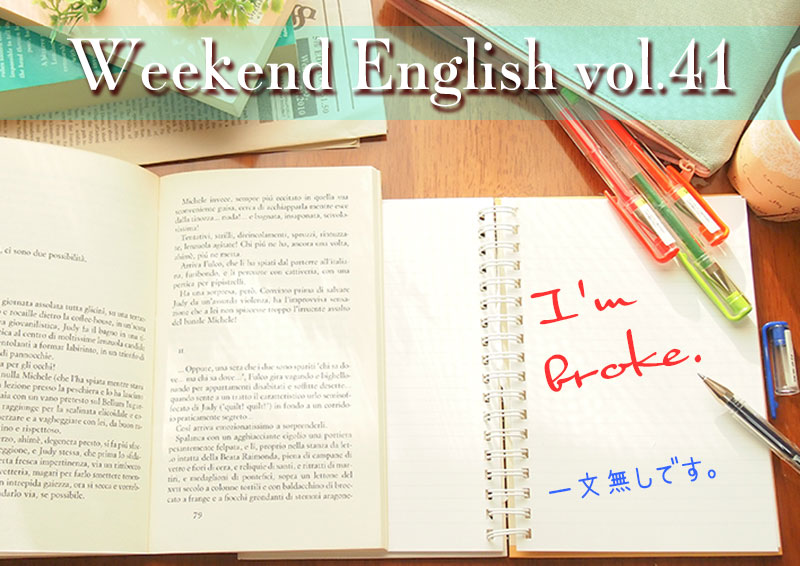スポンサーリンク

さて今日も元気に、アルクの「1000時間ヒアリングマラソン」 ![]() の「ダイアログで覚えるヒアリングマラソン必須表現100」で英語のお勉強。
の「ダイアログで覚えるヒアリングマラソン必須表現100」で英語のお勉強。
Dialog 11の会話部分で気になって調べて勉強した英単語や熟語のまとめ
目次 閉じる
- 英語「go to trouble to」の意味は「わざわざ〜する」
- go to trouble to(わざわざ〜する)を使った例文
- 「be broke」の意味は「無一文である」
- be broke(無一文である)を使った例文
- 「have a green thumb」の意味は「園芸が得意である」
- have a green thumb(園芸が得意である)を使った例文
- 「pull oneself together」の意味は「自制心を取り戻す、立ち直る」
- pull oneself together(自制心を取り戻す、立ち直る)を使った例文
- 「take over」の意味は「引き継ぐ、引き取る、接収する、持っていく 」
- take over(引き継ぐ)を使った例文
英語フレーズ「go to trouble to」は、
- わざわざ~する
という意味です。
「take the trouble to」も同じ意味で使えます。
またどちらも「to」の代わりに「of」が来ることもあります。
- Thank you for going to the trouble of coming to the airport and meeting me.
=Thank you for taking the trouble of coming to the airport and meeting me.
(わざわざ空港まで私を迎えに来てくださってありがとう。) - He went to the trouble to drive me home all the way from his house.
=He took the trouble to drive me home all the way from his house.
(彼はわざわざ自宅から私の家まで、車で送ってくれた。) - I will not go to the trouble of taking him there.
=I will not take the trouble of taking him there.
(ぼくはかれをそこへ連れて行くようなめんどうはしたくない。) - You need not go to the trouble to go there.
=You need not take the trouble to go there.
(君がわざわざそこにいく必要はない。) - He went to the trouble of coming to see her.
=He take the trouble of coming to see her.
(彼はわざわざ彼女に会いに来た。)
「go to trouble」だけで、「苦労する、手数を掛ける」という意味でも使えます。
- Don’t go to any trouble, please.
Please don’t go to any trouble.
(どうぞお構いなく。)
「be broke」……ん?
「broke」は「break」の過去形だよね。
「be動詞」の後に来てるから過去分詞の「broken」じゃないの?と思いますよね。
実はこの「broke」は動詞ではなく、<形容詞>なのです!
形容詞の「broke」は「無一文の」という意味
(発音:bróuk<ブロウク>、音節:broke)
- 無一文の、一文なしの、金欠の
- 破産した
「形容詞」で使われると、「無一文の・金欠の」という意味になるんですね。
なので、
- I’m broke.
は「全然お金ないよ。/すっからかんだよ。」という感じで使われます。
- I have no money.
という言い方もありますが、こっちは割とフォーマルな言い方です。
友達同士でカジュアルな感じで言うときは、
- I’m broke.
を使う感じですね。
ちなみに、
- I’m broken.
って言うと、また違う意味になりますよ。
この場合は「私は壊されている。/壊れている。」 という意味になっちゃいます。
- I’m broke.
(すっからかんです。) - I can’t go out tonight, I’m so broke.
(お金ないから今夜は出かけられない。) - I am completely broke, so I can’t go to dinner tonight.
(ほんとにお金ないから今夜が食事に行けません。) - After paying the rent, I’ll be broke.
(家賃を払ったらすっからかんだ。) - Can I borrow some money? I’m broke.
(お金貸してくれますか?お金がないんです。)
「have a green thumb」……
green(緑)の、thumb(親指)を持っている……?
直訳すると全く意味がわかりませんが、
「親指が緑色になるくらいに植物をいじっている」
ということから、「have a green thumb」は
- 園芸の才がある
- 園芸が上手である
- 花や植物を育てるのがうまい
という意味なんだそうです。
つまり「green thumb」は「園芸、植物栽培の才」ということです。
ちなみにイギリス英語だと「thumb」ではなくて「fingers」になります。
イギリス英語だと「finger」は親指を除いた人差し指や中指のことなので
- have green fingers
と複数形になるんですね。
- My mom loves gardening and has a green thumb.
(母は庭弄りが大好きで、花を育てるのが得意なんです。) - Just look at Mr. Simpson’s garden. He has a green thumb.
(シンプソンさんの庭を見てよ。彼は園芸が得意だね)
「pull oneself together」……
えー、oneself(自分自身)を、together(一緒に)、pull(引っ張る)……
直訳するとさっぱりですね。
「pull oneself together」の意味は、
- 立ち直る
- 自分を取り戻す
まぁバラバラになった感情を一まとめにして、気持ちを落ち着かせるということですかね。
- Pull yourself together.
(しっかりしろ。) - You’ve got to pull yourself together.
(しっかりしなきゃ駄目だ) - You have to pull yourself together and get a job.
(元気を出して、仕事を探しなさい。) - You must pull yourself together and face up to life.
(元気を取り戻して人生にたちむかえ。) - Pull yourself together, now. There’s no point in crying.
(しっかりしなさい。泣いても仕方ない。)
「take over」は句動詞で、
- 引き継ぐ、引き受ける
- 優位になる、成功する
- 奪う、奪取する
- 代わってやる、引き受ける
- 買収する、乗っ取る
という意味。
- I’ll take over now.
(後は引き受けた。) - I’ll take over from here.
(ここからは私が引き受けます。) - I will take over his job.
(彼の仕事を引き継ぐ。) - He will take over being in charge from me.
(彼が私の担当を引き継ぐ。) - He is going to go to take over.
(彼がそれを引き取りに行きます。) - He wants to take over his father’s business.
(彼は父の仕事を継ぎたい。) - A major corporation took over our town’s favorite family restaurant.
(大企業が私たちの町の大好きな家族経営のレストランを買収した。)
ちなみに「takeover」と1語で<名詞>になると、
- 獲得、奪取
- 企業買収
という意味になります。



